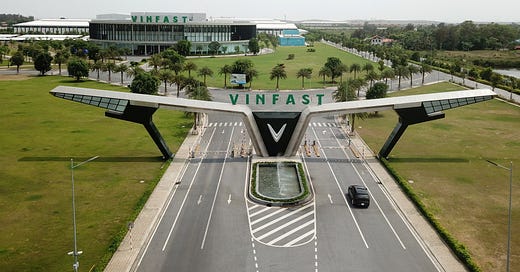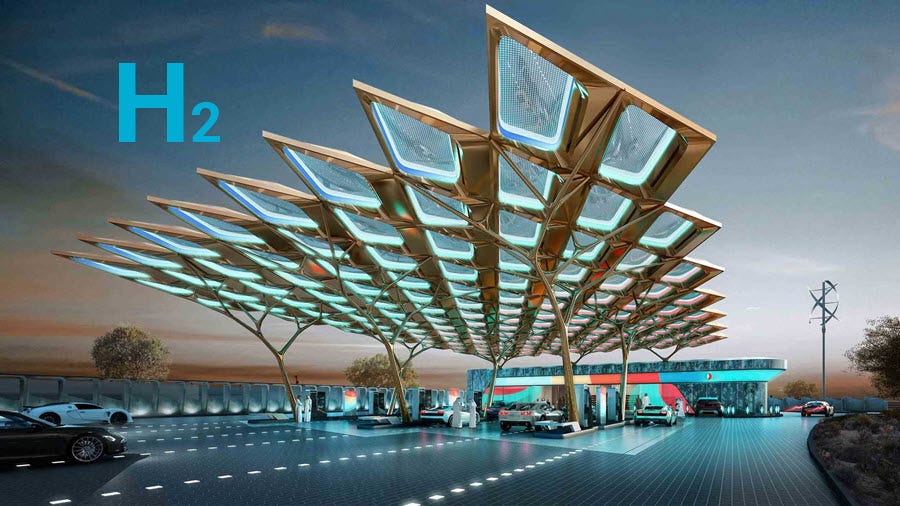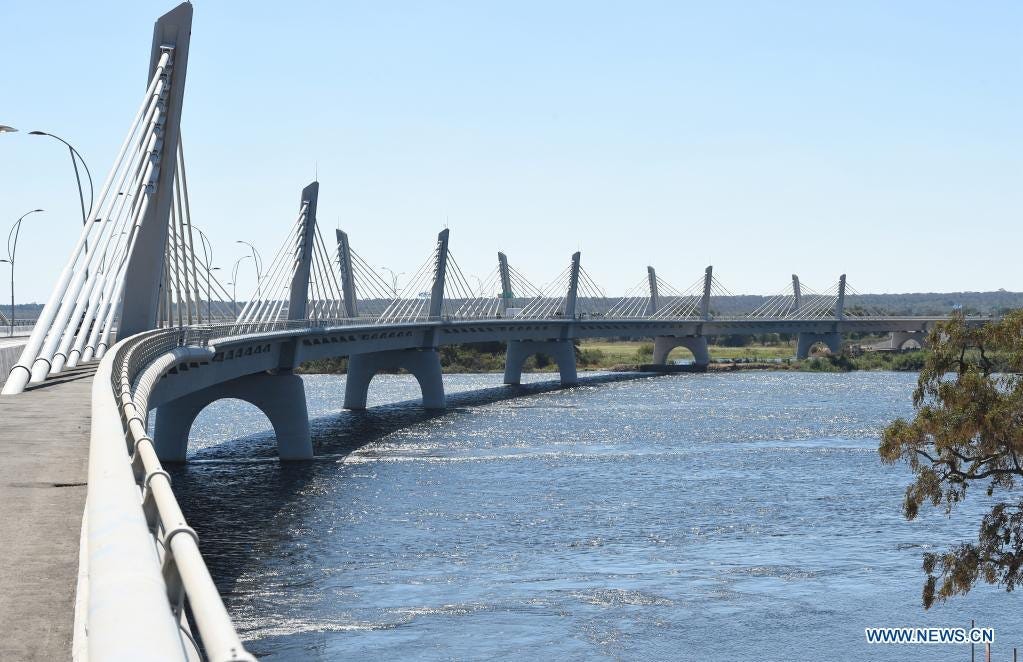Emerging Markets Daily - December 4
Vietnam EV Maker Preps US IPO, China-US 'Decoupling' and the Didi Exit, Hydrogen in the Middle East, China Cuts Africa Loans, El Salvador Buys Bitcoin Dip (Again)
The Top 5 Stories Shaping Emerging Markets from Global Media - December 4
Vietnam Electric Vehicle Maker Preps US IPO as Investors Rush to the Sector
Bloomberg
“Vietnamese conglomerate Vingroup JSC is restructuring its automobile unit VinFast ahead of a planned U.S. initial public offering in the second half of 2022.”
“Vingroup’s 51.52% stake in VinFast will be transferred to a Singapore subsidiary, the company said in an emailed statement on Saturday. The EV maker, which aims to roll out electric SUVs in the U.S., Canada and Europe late next year, is working with investment banks to prepare for an IPO that would make VinFast one of the first Vietnamese companies to be traded in the U.S.”
“VinFast could raise as much as $3 billion from an IPO, people familiar with the matter have said. The company expects to have a post-IPO value of $25 billion to $60 billion, Vice Chairwoman Le Thi Thu Thuy told Bloomberg News in November. The company is also in talks with potential investors to raise billions of dollars in both debt and equity to finance its electric vehicle expansion in the U.S., Thuy said in a separate interview.”
“VinFast has yet to decide if it will pursue a U.S. listing via a merger with a blank-check company or through a traditional IPO, Thuy said then. Investors are pouring funds into U.S.-listed electric vehicle stocks beyond market leader Tesla Inc., with truck-maker Rivian Automotive Inc. attracting $13.7 billion in November in the year’s biggest IPO. Bank of America Corp. has predicted a three-year wave of EV-related IPOs that could raise about $100 billion by the end of 2023.” Bloomberg reports.
As Didi Exits, Is the Era of Chinese-Listed Companies in the US Coming to an End?
CNN
“The era of big Chinese companies heading to the United States to raise money may have just come to an end. What's happening: China's Didi announced Friday that it will ‘immediately’ start the process of delisting from the New York Stock Exchange and pivot to Hong Kong.”
“Coming just months after the ride-hailing giant's Wall Street debut, the news sends a clear signal to investors as tensions between Washington and Beijing generate uncertainty. ‘Didi's repatriation to [Hong Kong] is a significantly worrying indicator for the larger US-Sino economic relationship,’ Brock Silvers, chief investment officer at Kaiyuan Capital in Hong Kong, told me. ‘Beijing essentially forced Didi's hand.’”
“Shortly after its $4.4 billion initial public offering in the United States in late June, Chinese regulators banned Didi from app stores in China, saying it broke data privacy laws and posed cybersecurity risks. Its share price collapsed.”
“The decision to target Didi was widely seen as punishment for its decision to go public overseas, and the company became a prime example of China's efforts to curb the power of Big Tech firms.”
“Didi's situation is set to spark a broader reassessment of Chinese companies that have listed shares abroad — including Alibaba, Pinduoduo, Baidu, JD.com, Nio (NIO) and Tencent Music (TME). Will they suffer the same fate? ‘Didi's repatriation looks likely to be the start of a trend, and the market should expect that others will follow,’ Silvers said. ‘Equity investors may not wait for the other shoe to drop.’” Julia Horowitz reports.
Hydrogen Projects Set to Scale up in the Middle East Over Next Few Years
The National
“Hydrogen projects, which are largely in pilot phases in the Middle East, will be scaled up to become fully commercial in seven years as the clean fuel becomes more economical to produce, according to an executive board member at Siemens Energy…”
“The German company, which was spun off from industrial conglomerate Siemens last year, is developing a Dh50 million hydrogen pilot project with Dubai Electricity and Water Authority (Dewa). The 300-kilowatt green hydrogen plant is being developed at the Mohammed bin Rashid Al Maktoum Solar Park, the site of the UAE's biggest solar plant.”
“Hydrogen is on track to become a multibillion-dollar industry in the Middle East, with total announced investments set to hit $44 billion, according to Platts' estimates. About $35bn of the commitments will be in projects that will become operational by 2030.”
“The German company is also exploring opportunities in Egypt, where it is developing a hydrogen hub as a viable producer of green hydrogen. Jennifer Gnana reports.
China Signals Cuts in Loans to Africa
The East African
“China has signalled a reduction in loans to Kenya and other African countries in coming years after it cut financial commitment to projects in the continent as much as a third in the next three years.”
“Nairobi has been a major beneficiary of China’s loans for the development of mega infrastructure projects such as roads and a modern railway over the last decade, making Beijing the largest bilateral creditor since 2015.”
“President Xi Jinping on Monday pledged — through a video link to the Eighth Ministerial Conference of the Forum on China-Africa Cooperation (FOCAC) in Senegal — to invest $40 billion (Ksh4.5 trillion) in African countries for three years.”
“That represents a 33.33 percent drop from the $60 billion (Ksh6.75 trillion) the world’s second-largest economy has committed to African countries in the last two FOCAC summits, which takes place every three years.”
“Lower funding to Africa, research economists say, could be a pointer that Beijing is starting to see signs of reduced benefits from the cash it commits in the continent. ‘I think the Chinese debt has reached or it’s nearing a point of diminishing returns if the big-ticket public expenditures in Kenya, for example, are anything to go by,’ said Churchill Ogutu, an economist at IC Asset Managers (Mauritius).”
“China has over the last two decades established itself as a financier of first resort for many low- and middle-income countries, providing record amounts of international development finance, according to the researchers at College of William & Mary in a report late September. The findings suggested that African countries received 42 percent of all Chinese official development assistance between 2000 and 2017.” Constant Munda reports.
Bitcoin Falls Sharply, El Salvador Buys the Dip (Again)
Wall Street Journal
“Bitcoin and other cryptocurrencies fell sharply Saturday, another sign that investors were pulling back from riskier bets after this week’s stock-market selloff. Bitcoin, the largest cryptocurrency by market value, was trading at $47,555.84 around 9:30 a.m. Eastern Time on Saturday, down 16% in 24 hours, according to data from CoinDesk. Around midnight it had plunged to $42,000 before bouncing back. Ether, the second-largest cryptocurrency, was down more than 13%.”
“The declines were widespread across the cryptouniverse. Other widely traded cryptocurrencies including Solana, Dogecoin and Shiba Inu coin lost more than a fifth of their value. Bitcoin and other cryptocurrencies are notoriously volatile and often plunge for mysterious reasons. Disquiet in the stock market over the new Omicron variant of Covid-19 and the Federal Reserve’s response to inflation might have played a role.”
“The price of bitcoin seesawed later Saturday after El Salvador President Nayib Bukele, whose country adopted bitcoin as a national currency in September, said in a Twitter post that the country had bought 150 coins for an average of $48,670 each. “El Salvador just bought the dip!” he said. He later wrote that the country had ‘Missed the f***ing bottom by 7 minutes,’ followed by a laughing emoji.” The Wall Street Journal reports.
A life spent making mistakes is not only more honorable, but more useful than a life spent doing nothing. - George Bernard Shaw





